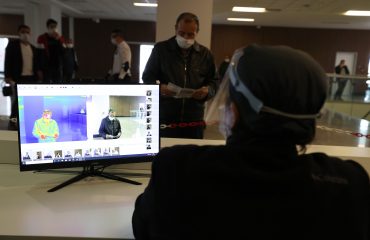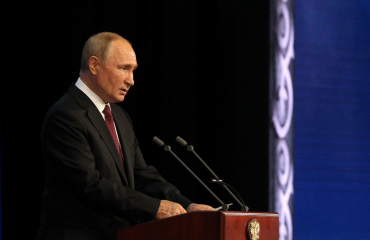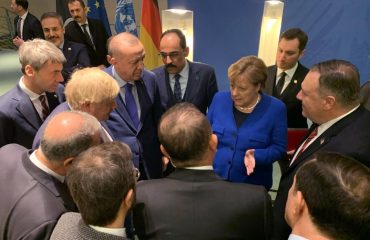It is almost clear what might happen if all chances are not exhausted in the crisis between the U.S. and Turkey over the Turkish decision to purchase Russian S-400 missile systems. Here are some of them:
- Russian missiles would be delivered to Turkey soon and be activated,
- The U.S. Administration would then likely suspend the delivery program of F-35 jets to Turkey and announce economic sanctions on the country. This will affect not only the Turkish economy but also Turkey’s future military purchases from the U.S.,
- In reaction to that, Turkey might limit the activities of the U.S. in its territory, including those conducted at the strategic airbase of Incirlik, and the early warning radar of the Missile Shield project in Malatya,
- In return, the Americans could suspend the talks with Turks over a possible “security zone” along the Syria border and increase collaboration with the PKK affiliate YPG as the backbone of SDF out there,
- Turkey’s military hits on the YPG could bring back to mind U.S. President Donald Trump’s tweets where he speaks of “devastating” the Turkish economy. It could also bring to mind the currency crisis Turkey suffered during the Brunson row in late summer 2018,
- Americans can force Turkey further to pick sides between them and Turkey’s neighbour Iran, amid threats of more sanctions,
- Economically and militarily cornered, President Tayyip Erdoğan could get into closer cooperation with Russia and China.
There might be other scenarios in question if the crisis follows the current trajectory. Yet there is still a chance to exit it, which could stop the deepening of the chasm between Turkey and the U.S. This could save the Turkish economy from worse circumstances that could in turn also contribute to the weakening of its alliance with the NATO. Otherwise it’s already too late to expect Erdoğan to be willing to give the impression of paddling back against Trump’s threats, or expect Trump to give concessions to Erdoğan so as to make Russian President Vladimir Putin happier, or expect Putin to miss the opportunity to further expand one of the biggest diplomatic chasms that Moscow was able to trigger within the NATO.
The exit from the crisis could necessitate NATO involvement.
The Americans have not even yet answered Turkish Foreign Minister Mevlüt Çavuşoğlu’s proposal to the U.S. Secretary of State, made months ago, to set up a “technical” commission that would determine whether the use of the S-400s could really open holes in NATO (and U.S.) air and missile defence over the use of the F-35s. That is the basic objection by the American military in reference to the recent House of Representatives voting which said if Turkey would not cancel the purchase, Turkey should be taken out of the F-35 program and be subjected to economic sanctions. Çavuşoğlu, on the other hand, said that Norwegian and Israeli F-35 have been flying in the presence of S-400s in the Baltics and Syria for some time and if they are able to learn everything from each other, so far S-400s should have learned everything about Western defence. He added that it was possible for Turkey not to plug the S-400s to NATO system and to instead use it separately.
So far American diplomacy has ruled that option out and said that even if the S-400 would not be taken out of their boxes, the red line would be considered crossed. That is despite what the NATO Secretary General Jens Stoltenberg has said following his meeting with Erdoğan in Ankara on May 6 that, defying F-35s from Turkey could harm the overall NATO system, not only Turkey. It is a 20-year project and Turkey is a co-producer.
Let’s take the Brunson case as an example; a case where Trump (and Vice President Mike Pence) believe that they got the pastor freed by applying monetary pressure on Turkey. They might think that they can do the same in S-400s rift. However this time there is a variety of other strong factors, such as Putin, Syria, and Erdoğan’s commitment to domestic politics concerning Turkey’s determination to buy whichever weapon it can afford for its national defence.
In the meantime, another diplomatic channel has been opened between Turkish Defence Minister Hulusi Akar and Defence Secretary Patrick Shanahan. Despite endorsing Erdoğan and Çavuşoğlu’s positions that the S-400 is a “done deal” and recently saying that Turkey has started to take its precautions in case possible sanctions could hit other Turkish military purchases, Akar also underlines that the talks are ongoing.
There was an interesting detail voiced (again by Akar) during the American-Turkish Council meetings, in Washington in mid-April. In the opening session of the meetings, Akar carefully highlighted that “Turkey will stay in NATO” and that it was a part of modern Turkish identity.
Ankara’s aim is not to leave NATO but a redefinition of its place in the Western system, especially vis-a-vis the U.S. Erdoğan aid it a number of times that Turkey doesn’t an to be a buyer only like many other countries in the region. The European members of NATO are well aware of that. Akar revealed recently that the French President Emmanuel Macron has proposed Erdoğan during the last NATO summit that his country was ready to send Turkey a Sampt-T missile battery for urgent needs, instead of harming NATO system. Turkey is currently engaged in feasibility talks with EuroSam for the French-Italian consortium for the joint design and production of NATO-interoperable missile defence systems.
Leaving the proposal of having a bilateral Turkish-American commission to examine S-400/F-35 situation, Ankara is now testing the waters for the possibility of a commission with the inclusion of the NATO. Turkish sources say the government would accept whatever would come out of such a commission. If such a trilateral commission is established, Turkey could be ready to avoid opening the box of the S-400s until the report of the commission is out. This could possibly be interpreted by Trump and the Congress as a sign that the deal could be done but not “completed”. The report of such a commission could give a face-saving exit rhetoric to President Erdoğan regarding the Turkish public opinion. Because as Akar keeps stressing, Turkey has no strategy to leave the NATO.
That could upset Putin with possible consequences concerning Syria, as well as Turkish tourism and agricultural exports to Russia. But on the other hand, Russia has interests in cooperating with Turkey; they already harmed the NATO solidarity and made Americans acknowledge that S-400s are superior to the American Patriot missile systems. Regarding the PKK rift with Americans in Syria, one could pay more attention to what is happening between Erdoğan’s government and the PKK’s imprisoned leader nowadays; perhaps another “dialogue” process, this time including Syria might be on its way.


